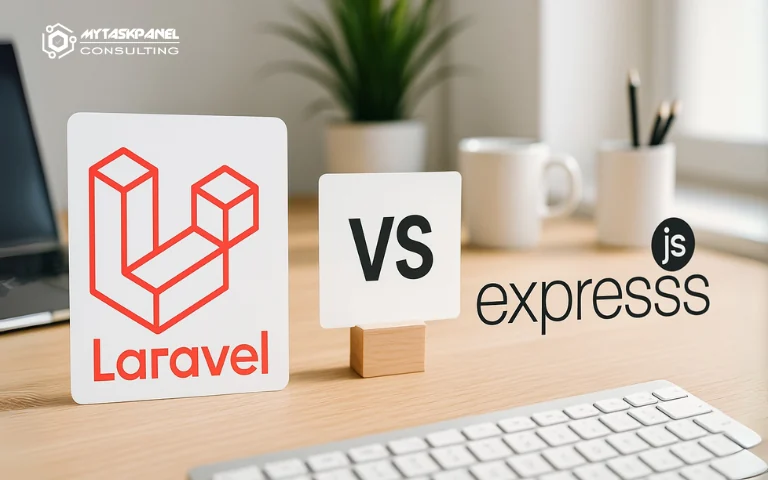When starting the development of a web application, one of the most important technical decisions is choosing the right back-end framework. This choice can impact development speed, performance, code maintainability, and long-term scalability. Among the most widely used frameworks by developers and companies are Laravel and Express.js. Both are powerful and mature, but they differ significantly in language, approach, structure, and use cases.
In this article, we explore the advantages and disadvantages of Laravel vs. Express.js, with examples and practical recommendations to help you choose the best option based on your project type.
What is Laravel?
Laravel is an open-source PHP framework that follows the MVC (Model-View-Controller) architectural pattern. Created by Taylor Otwell, it’s designed to develop web applications in a structured, efficient way with elegant syntax.
Its main goal is to simplify common web development tasks such as routing, database access, authentication, form validation, and email sending. Laravel stands out for offering a very complete ecosystem, with tools like:
- Eloquent: a powerful ORM for intuitive database interaction.
- Blade: its clean and efficient templating engine.
- Artisan: a command-line tool to automate development tasks.
- Laravel Sanctum and Passport: for token-based authentication and API security.
- Laravel Forge, Nova, and Vapor: additional tools for deployment, admin panels, and serverless environments.
Laravel is especially recommended for enterprise-grade projects that require a strong structure from the outset.
Advantages of Laravel
Laravel provides a clear structure and built-in tools that accelerate development and encourage good practices. Key advantages include:
- High productivity: thanks to CLI tools (Artisan), migrations, seeders, and scaffolding.
- Robust ecosystem: supporting everything from development to deployment.
- Built-in security: including CSRF protection, validation, password hashing, etc.
- Great for large teams: MVC architecture and conventions keep code organized.
- Active community and solid documentation: making problem-solving easier.
Disadvantages of Laravel
However, Laravel also has some limitations:
- Heavier footprint: may be overkill for very simple projects.
- Requires PHP knowledge: which can be a barrier for JavaScript-oriented teams.
- Lower performance in high-concurrency environments: PHP has improved, but it’s not as fast as Node.js for asynchronous tasks.
What is Express.js?
Express.js is a minimalist web framework for Node.js, designed to build web applications and APIs quickly, simply, and flexibly. It uses JavaScript, allowing both front end and back end to share the same language—a big plus for modern teams.
One of Express.js’s biggest strengths is its lightweight nature: it doesn’t impose structure or come with many built-in tools, giving developers full freedom to organize their projects. Key features include:
- Efficient handling of HTTP routes.
- Native support for custom middlewares.
- High performance thanks to Node.js’s V8 engine.
- Natural integration with modern tools like WebSockets, GraphQL, MongoDB, or JWT.
- Ideal for microservices, serverless architectures, and RESTful APIs.
Express.js is well-suited for agile projects, real-time applications, or when you need to build a fast, flexible back end.
Advantages of Express.js
Express.js takes a completely different approach. Its core benefits are:
- Speed and efficiency: ideal for real-time apps and high-concurrency environments.
- All in JavaScript: simplifies the tech stack (especially for frontend-first teams).
- Total flexibility: no rigid structure enforced.
- Natural scalability: perfect for microservices and decoupled APIs.
- Strong compatibility: works well with tools like MongoDB, Redis, RabbitMQ, GraphQL.
Disadvantages of Express.js
Its flexibility, however, can be a double-edged sword:
- Lack of predefined structure: can lead to chaos in larger projects without strong practices.
- Async learning curve: teams unfamiliar with callbacks, promises, or async/await may struggle.
- More dependencies: developers must manually configure and maintain more components.
When to choose Laravel
Laravel is a great choice when:
- Your team is experienced with PHP or frameworks like Symfony or CodeIgniter.
- You need to build a full system with frontend, backend, and admin panels.
- The project involves authentication, user roles, complex forms, or reporting.
- You want a solid, structured environment from the start.
- You prefer having ready-to-use tools rather than assembling everything manually.
When to choose Express.js
Express.js is the best choice when:
- Your team already works with JavaScript or TypeScript.
- You’re building a REST API for a SPA or mobile app.
- You need to develop fast, lightweight, and highly scalable services.
- You’re using a microservices or event-based architecture.
- You’re building real-time apps like chats, live dashboards, or notification systems.
Laravel vs. Express.js: a natural comparison
If you’re looking for immediate productivity, robust architecture, and lots of built-in features without needing to make many technical decisions, Laravel is the way to go. If your priority is speed, flexibility, and a 100% JavaScript stack, then Express.js is ideal.
Think of Laravel as a full-featured office suite, ready to work, with everything included. Express.js is more like a customizable toolbox, you assemble what you need, with full freedom and precision.
Ultimately, the choice between Laravel and Express.js should not be about which is «better», but about which one is right for your project, your team, and your technical goals.
Laravel shines for its structure, built-in tools, and development speed in enterprise or medium-to-complex projects. Express.js stands out for its performance, adaptability, and compatibility with modern technologies, making it excellent for APIs, microservices, and real-time development.
Both frameworks are mature, reliable, and widely used in production. At our IT consultancy, we help organizations make technical decisions like this based on their real-world context. If you’re considering Laravel or Express.js for your next project, get in touch and let’s work together to find the best solution for your needs.
Need help choosing the right tech stack for your project?
At MyTaskPanel Consulting, we support you in technical and strategic evaluation to ensure your decision aligns with your business goals.
Contact us and discover how we can help you.

